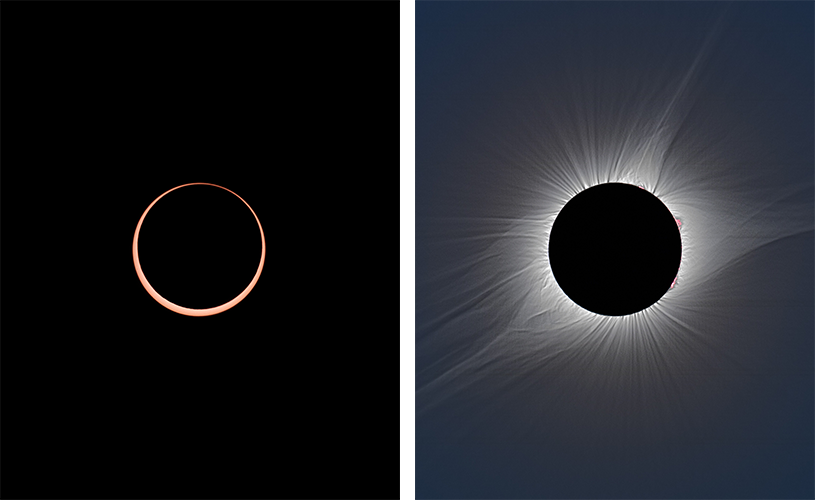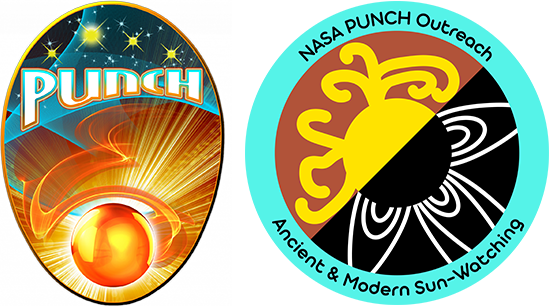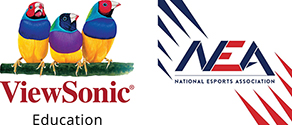
Friday's Program | Saturday's Program | Posters | Session Videos | Registrants List

The American Astronomical Society (AAS) Solar Eclipse Task Force hosted a solar eclipse planning workshop Friday-Saturday, June 9-10, 2023, at the New Mexico Museum of Natural History & Science, 1801 Mountain Road NW, Albuquerque, NM 87104. The workshop was funded in part by NASA.
 The outreach team for NASA's PUNCH (Polarimeter to UNify the Corona and Heliosphere) mission collaborated with us to organize and implement the workshop. Under the theme "Ancient & Modern Sun-Watching," PUNCH Outreach is exploring links between NASA heliophysics and a petroglyph in Chaco Canyon, NM, that may represent the solar corona during an eclipse there in 1097. Both the leader of the PUNCH mission, Craig DeForest, and the leader of the outreach team, Cherilynn Morrow, were on hand with resources to help enrich the experience of workshop participants.
The outreach team for NASA's PUNCH (Polarimeter to UNify the Corona and Heliosphere) mission collaborated with us to organize and implement the workshop. Under the theme "Ancient & Modern Sun-Watching," PUNCH Outreach is exploring links between NASA heliophysics and a petroglyph in Chaco Canyon, NM, that may represent the solar corona during an eclipse there in 1097. Both the leader of the PUNCH mission, Craig DeForest, and the leader of the outreach team, Cherilynn Morrow, were on hand with resources to help enrich the experience of workshop participants.
Format
The workshop was conducted in hybrid format, accommodating both in-person and remote/virtual attendees. Plenary sessions and most breakout discussions were accessible in real time to off-site attendees via Zoom Events. We record all the plenary sessions and as many of the breakout sessions as we could, and we will make the recordings available on this web page and on our YouTube page by the end of June.
Program
Plenary sessions were held in the STEM Lecture Hall (1st floor). Breakout discussion sessions were held there and in STEM Classroom 2 (also 1st floor). We also had some resource tables and activity demos outside the Planetarium (2nd floor), and solar observing was conducted in the Observatory (also 2nd floor) and on the deck outside.
Except where indicated below, video recordings of plenary and breakout sessions are available on the AAS Solar Eclipse Task Force YouTube channel and via the links from session titles below. We have provided copies of the presentation slides as PDFs (linked from the presenters' names); not all speakers used slides or provided them to us. These are for your personal use only. If you wish to publish or otherwise reproduce any of the content in these files, you must obtain permission from the presenters — otherwise you may be in violation of copyright law. If you need help contacting a presenter, email the AAS Solar Eclipse Task Force.
Workshop Day 1: Friday, June 9, 2023
09:00 am to 10:15 am — Welcome & Introductions | Plenary Session 1
- Data-Driven Lessons Learned from the 2017 U.S. Eclipse and What to Expect in 2023 & 2024
- Tips for spreading the word about what we learned from 2017; how to present this information to the uninitiated to help get them on board; designing experiences that take into account what we learned last time; strategies for measuring success.
- Presenters: Debra Ross (AAS Solar Eclipse Task Force) on the types of impact data available and how to find it; Jay Anderson (Eclipseophile.com) on climate vs. weather and how to interpret climate statistics for eclipses; Kate Russo (BeingInTheShadow.com) on missed opportunities from the Australian total solar eclipse of April 20, 2023; Janet Ivey (Janet's Planet) on a case study of the August 2017 solar eclipse in Nashville, Tennessee (her name links to a YouTube video that she prerecorded for her presentation); Kristen Erickson (NASA) on lessons drawn from NASA's eclipse programs in 2017; Carrie Falzone (Vertical Insite) on setting up websites to maximize visibility and measure success.
10:30 am to 11:30 am — Plenary Session 2
- The Personal and Community Experience On & Off the Eclipse Path and in Urban & Rural Environments
- Messaging tips about what eclipses are like and why they can offer a profoundly personally meaningful and community-building experience; designing events for before, during, and after maximum eclipse.
- Presenters: Cris White (Earth to Sky Partnership) on how to create community-oriented, place-based engagement to tie a solar eclipse, which happens out in space, to your location on Earth; Trish Erzfeld (Perry County Heritage Tourism) on engaging rural communities; Gena McPherson (Ravenna, Nebraska) on how even small, remote communities with few resources can prepare for an eclipse; Harvey Henson (Southern Illinois Univ., Carbondale) on designing large-scale (e.g., football-stadium-sized) events; Julia Bradshaw (Oregon State University) on creating arts events and developing community preparedness; Kate Russo (BeingInTheShadow.com) on making the most of your location outside the path of totality.
12:30 pm to 01:30 pm — Parallel Breakout Discussion Sessions
- Breakout Session 1: Follow-up to Plenary Session 1 on Data from 2017 and Expectations for 2023 & 2024
- Breakout Session 2: Follow-up to Plenary Session 2 on Community Planning On and Off the Eclipse Paths (not recorded)
01:45 pm to 02:45 pm — Plenary Session 3
- Transportation & Emergency Management for Communities in the Path and on Major Routes into the Path
- Tips for informing communities and all relevant stakeholders in advance about how to prepare for an influx of visitors; traffic and related considerations for planning large-scale eclipse events.
- Presenters: Jim Stack (Genesee Transportation Council) on strategies and tactics that the GTC has been using to motivate stakeholders and convey transportation issues; Lori Maher (Genesee Transportation Council) on how public employees should follow their instincts, educate themselves, find influencers, collaborate, and convey planning needs clearly and frequently to decision-makers, even if they lack specific guidance from their organization’s leadership; Colin Campbell (Ohio Emergency Management Agency) on emergency management planning coordination and efforts from a state perspective and how we are supporting local efforts as well; Mark Howell (Grounded Truths, LLC) on out-of-the-box thinking in preparedness and response as well as the 3 T's of eclipse planning — travel/transportation, toilets, and trash — especially for rural communities; Michael Zeiler (GreatAmericanEclipse.com) on what his drive-shed maps show and what they mean for your community.
03:00 pm to 04:00 pm — Parallel Breakout Discussion Sessions
- Breakout Session 3: Follow-up to Plenary Session 3 on Transportation & Emergency Management
- Breakout Session 4: (folded into Breakout Session 3)
 04:15 pm to 04:45 pm — Day 1 Closing Remarks
04:15 pm to 04:45 pm — Day 1 Closing Remarks
Workshop Day 2, Saturday, June 10, 2023
09:00 am to 10:15 am — Welcome Back & Announcements | Plenary Session 4, Part 1
- Engaging Formal & Informal Educators and Their Audiences in Solar Eclipses
- Pros and cons to consider when deciding whether to cancel school and work on eclipse day; how to ensure that everyone under the Sun experiences the eclipse safely and enjoyably and understands the basic science of what's happening and what they're seeing.
- Presenters: Angela Speck (Univ. of Texas, San Antonio & AAS Solar Eclipse Task Force) on the variety of audiences and venues for engaging formal and informal educators; Dennis Schatz (Institute for Learning Innovation) & Charles Fulco (Brooklyn Friends School) on convincing administrators to approve school-based eclipse watches (“No Child Left Inside”) and connecting solar eclipses to national education standards; Andrew Fraknoi (Univ. of San Francisco & San Francisco State Univ.) on setting up partnerships for education; Kelly Korreck (NASA) & Alex Lockwood (NASA) on NASA's eclipse-education efforts; Kim Eaves (National Oceanic & Atmospheric Administration) on NOAA's plans to educate students and teachers about the upcoming eclipses.
10:30 am to 11:30 am — Plenary Session 4, Part 2
- Engaging Formal & Informal Educators and Their Audiences in Solar Eclipses
- Pros and cons to consider when deciding whether to cancel school and work on eclipse day; how to ensure that everyone under the Sun experiences the eclipse safely and enjoyably and understands the basic science of what's happening and what they're seeing.
- Presenters: Julie Bolduc-Duval (Discover the Universe) on eclipse-education efforts under way in Canada; Derrick Pitts (Franklin Institute) on strategies for science museums and planetariums on or off the eclipse paths (download a PDF about his eclipse-viewing tent); Doug Duncan (University of Colorado) on two new educational and inspirational videos about solar eclipses from the Science Through Shadows project (click on Doug's name to go to the page with the videos); Craig DeForest (Southwest Research Institute) on NASA's PUNCH mission and its connection to the coming solar eclipses; Cherilynn Morrow (NASA PUNCH Outreach) & Jayne Aubele (NM Museum of Natural History & Science) on PUNCH connections to education, citizen science, and New Mexico; Amir Caspi (Southwest Research Institute) on Citizen CATE 2024's education and community partnerships.
12:30 pm to 01:30 pm — Plenary Session 5
- Exploring the Universe of Solar Eclipse Resources for Education & Outreach
- Activities and curricula that teach about eclipses at various grade levels, consistent with relevant standards; desired learning outcomes for different age levels; learning tools and activities to enhance the eclipse experience.
- Presenters: Deb Ross (AAS Solar Eclipse Task Force) on resource links from the AAS; Dan McGlaun (Eclipse2024.org) on visual resources and eclipse simulators; Michael Zeiler (GreatAmericanEclipse.com) on maps of eclipse circumstances; Dennis Schatz (Institute for Learning Innovation) & Andrew Fraknoi (Univ. of San Francisco & San Francisco State Univ.) on education resources for librarians, teachers, and school administrators; Norma Reis (Brazil) on podcasts for educators about eclipses in history; Cherilynn Morrow (NASA PUNCH Outreach) on the "PUNCH Bowl" of outreach resources related to the theme "Ancient & Modern Sun-Watching" (the link from Dr. Morrow's name goes to the PUNCH Outreach Products website, which she browsed during her presentation).
01:45 pm to 02:45 pm — Parallel Breakout Discussion Sessions
- Breakout Session 5: Resource Share-a-Thon (NOTE: This hands-on session will not be accessible via Zoom Events and wasn't recorded.)
- Presenters: Cherilynn Morrow (NASA PUNCH Outreach), Angela Speck (Univ. of Texas, San Antonio & AAS Solar Eclipse Task Force), Dan McGlaun (Eclipse2024.org); Michael Zeiler (GreatAmericanEclipse.com), Doug Duncan (Univ. of Colorado, Boulder), Dennis Schatz (Institute for Learning Innovation); anyone else with resources to share!
- Breakout Session 6: Eclipse Science for Everybody
- Presenters: Kevin Reardon (National Solar Observatory) on understanding the solar corona; Holli Kohl (NASA Goddard Space Flight Center / Science Systems and Applications, Inc.) on citizen science with GLOBE Eclipse; Juan Carlos Martinez Oliveros (Univ. of California, Berkeley) on photographing totality for the Eclipse Megamovie.
03:00 pm to 04:45 pm — Plenary Session 6 | Workshop Closing Remarks
- Ensuring Access for All to the 2023 & 2024 North American Solar Eclipses
- Strategies for messaging in advance to underserved communities; various ways to experience eclipses, including using assistive technologies.
- Presenters: Anita O’Brien (Rochester Accessible Adventures) on ensuring that all of your event plans are developed through a lens of inclusion; Allyson Bieryla (Center for Astrophysics | Harvard & Smithsonian) on ensuring access to solar eclipses for blind and visually impaired persons via LightSound; Cherilynn Morrow (NASA PUNCH Outreach) on using tactile art representations of the solar corona; Joe Aragon (Math & Science Educator) on strategies for engaging Native American and Hispanic communities in solar eclipses; Derrick Pitts (Franklin Institute) on outreach to diverse audiences.
Posters
Click on the links below to download and view the posters, which are provided as PDFs. These posters are copyrighted by the authors; if you wish to reproduce them, repost them, or otherwise use content from them, you must seek permission from the authors. If you need help contacting them, email the AAS Solar Eclipse Task Force for assistance.
Eclipse Resources
- “Eclipse2024.org Eclipse Resources for 125,000 Communities,” Daniel McGlaun
- “Eclipse2024.org Eclipse Simulator,” Daniel McGlaun
- “Eclipse2024.org Site Information — English Version,” Daniel McGlaun
- “Eclipse2024.org Site Information — French Version,” Daniel McGlaun
- “Eclipse2024.org Site Information — Spanish Version,” Daniel McGlaun
- “Totality: A New Free Planetarium Show,” Patricia Reiff
- “Two Tools for 2024 Solar Eclipse Enjoyment — English Version,” Gordon Telepun
- “Two Tools for 2024 Solar Eclipse Enjoyment — Spanish Version,” Gordon Telepun
Eclipse Science
- “Dynamic Eclipse Broadcast Initiative,” Bob Baer et al.
- “The Earth Science Angle: Study Eclipses as a Volunteer Observer,” Kristen Weaver
Eye Safety
- “Tips for Wearing Solar Eclipse Glasses,” Kate Desulis
Formal Education
- “2024 Solar Eclipse: Student Perceptions,” Bethany Swindell & Jamie Stacy
Informal Education & Public Engagement
- “Connecting the Eclipse to Local & Community History,” Sarah J. Reynolds
- "Eclipse Fests: Experience Totality Together," Loretta Hidalgo Whitesides
Media Relations
- “Let’s Get the Number Close!” Thomas Hockey
Local Planning
- “3 Ts & 2 Cs for Eclipse Planning,” Mark Howell
- “UAS Towards 2024 Eclipse: Educational Incidence in Sinaloa,” Edgar León et al.
- “Visit Uvalde County,” Hailey Hart
National Planning
- “Mexico Under the Shadow of the Moon,” René Alberto Ortega Minakata
More Information
See our workshops page for information about past and future workshops, including links to recordings and presentations from our April 2021, April 2022, and October 2022 workshops.
For questions about the workshop or other activities of the AAS Solar Eclipse Task Force, email eclipse@aas.org. If you're not already on our email list to receive announcements about upcoming workshops and other task force activities, please click the following button and fill out our sign-up form.

